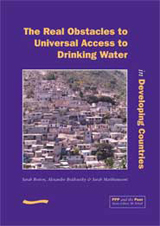
My WEDC
Gateway to managing your resources and events
Water Engineering and Development Centre

Author(s): Botton, Sarah | Brailowsky, Alexandra | Matthieussent, Sarah | Sohail, M. (ed)
Publisher: WEDCSeries: PPP and the Poor
Collection(s): Water and sanitation resources | WEDC Bookshop
Price: £9.95
ISBN: 9781843800897
Links:
The purpose of the project Public Private Partnerships and the Poor is to determine workable processes whereby the needs of the poor are promoted in strategies which encourage public-private partnerships (PPP) in the provision of water supply and sanitation services. One of the key objectives is to fill some of the gaps which exist in evidence-based reporting of the facts and issues around the impacts of PPP on poor consumers.
The purpose of this article is to provide a retrospective analysis of two drinking water access programmes aimed at populations living in the poor neighbourhoods of (1) Buenos Aires (Argentina) and (2) Port-au-Prince (Haiti). The authors reflect on the real stakes behind these initiatives, based on an analysis of both experiences with their different development structures, and of the management models introduced (giving new momentum to the state-owned company in the case of Haiti and building a public-private partnership in Argentina).
Keywords:
Argentina | Haiti | Low-income communities | Private sector | Public private partnership